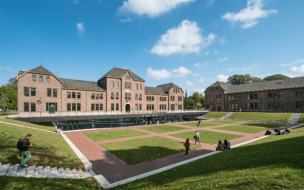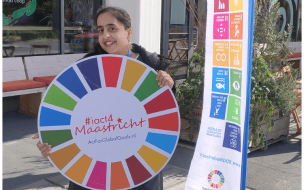Maastricht School of Management (MSM) is among the schools pushing that agenda, with a green-focused curriculum helping future business professionals grow into responsible leaders.
The school was an early signatory of the United Nations Principles for Responsible Management Education (PRME) commitment, which aims to drive sustainable business development and educate future leaders. And MSM's graduate management education programs incorporate sustainability from the get-go.
Students study general topics like managing cultural diversity and corporate social responsibility (CSR), as well as ethics, before being given the opportunity to delve deeper into sustainability by choosing the specialization in International Business and Sustainable Development, as part of the MBA curriculum, or as an additional curricular option for the Master in Management.
A platform for tomorrow’s green business leaders
Sara Hedayati was influenced by her upbringing in Iran, where she started thinking about sustainability from a young age.
“In the autumn the air would become very polluted, and so I was always searching for ideas to decrease it,” she recalls.
That sustainability made up a large part of the compulsory content on the MSM Master in Management was a motivating factor in her choosing the school for her degree. She was also voted MSM’s Sustainability Student of the year, for her passion for positive change and work in global sustainability.
At MSM, Sara learnt how to make a tangible difference to communities. She worked on a group project focused on making Maastricht School of Management a more sustainable institution, and says that understanding the ways in which the school could be adapted had an impact on how she then viewed the role sustainability could play in wider society.
How MSM teaches students about sustainability
Around a third of students each year choose MSM’s sustainability specialization on the MBA. MM students on the other hand, have a compulsory group company project integrated into their curriculum. The topic changes every year, but it centralizes around digital transformation or sustainable business.
Within MSM's sustainability specialization—which MM students can also choose to study at an extra cost—modules include sustainability in the global economy, green & inclusive innovation, fair trade & global value chains, and international human resource management.
A regular highlight in the school’s calendar is the SDG-Challenge, open to both MBA and MM students. The challenge encourages students to focus on the Sustainable Development Goals set by the UN to tackle climate change and world inequalities.
Students work in teams to come up with business solutions that tackle issues related to climate change and sustainability—Sara’s team were tasked with making commerce more sustainable.
“I could see how seriously everyone took the challenge in our group presentations,” Sara adds. “Coming up with solutions to help make company supply chains sustainable had a huge impact.”
Students are taught across MSM’s MBA and Master’s in Management to view sustainability and business in a wider context. Viewing the purpose of a business beyond creating value for shareholders, and instead looking at a variety of stakeholders, is key. But it can’t be boring.
“If you want to have a core curriculum with additional activities for a sustainable education, it can’t only be theoretical,” explains Hermina Kooyman, deputy director global education programs & manager enrollment and career services. “Schools need to do it in a fun way.”
MSM have also announced a new scholarship. Targeting like-minded sustainable students, the SDG Change-maker Scholarship is open to students who can show a commitment to sustainable futures and awareness of how their education can positively impact business and the wider world.
Recruiting climate conscious leaders
From sustainability in the global economy to fair trade and value chains, learning about sustainability in action enables students to see the current climate in context. This is giving graduates a leg up in the jobs market.
“There is an increase in companies doing CSR reporting in their annual reports relating to sustainability,” explains Adriana Seclaman, senior officer for MSM global education programs. “A hands-on and theoretical education in sustainability gives students an advantage in the business world.”
Hermina notes how an increase in sustainability awareness is impacting recruiters. “I tell students when applying for jobs to look at the vision and mission of the company,” she says, “students need to match their values with a company they believe in.”
This has become a focus for both graduates and employers. Departments are focusing on sustainable development goals (SDGs) now more than ever.
“They need graduates who have knowledge and skills to implement and measure their SGDs,” Hermina adds.
And for students, that all starts on campus.
“It’s in the small things,” Sara says, “there were no water coolers which sometimes might annoy people, but the fact it reduces waste and encourages people to bring their own bottles is only a good thing.”








